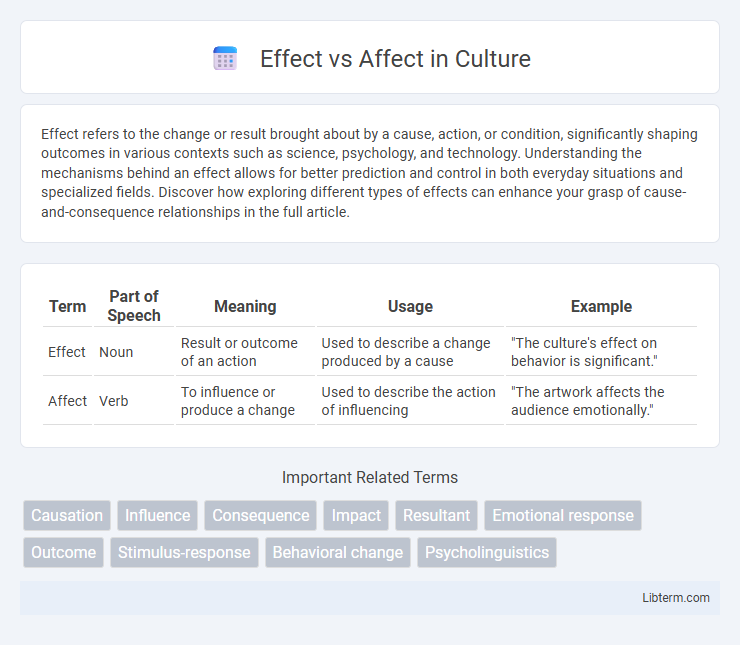Effect refers to the change or result brought about by a cause, action, or condition, significantly shaping outcomes in various contexts such as science, psychology, and technology. Understanding the mechanisms behind an effect allows for better prediction and control in both everyday situations and specialized fields. Discover how exploring different types of effects can enhance your grasp of cause-and-consequence relationships in the full article.
Table of Comparison
| Term | Part of Speech | Meaning | Usage | Example |
|---|---|---|---|---|
| Effect | Noun | Result or outcome of an action | Used to describe a change produced by a cause | "The culture's effect on behavior is significant." |
| Affect | Verb | To influence or produce a change | Used to describe the action of influencing | "The artwork affects the audience emotionally." |
Introduction to Effect vs Affect
Effect refers to a noun meaning the result or outcome of a change, while affect is primarily a verb indicating the action of influencing something. Understanding the distinction between effect and affect is crucial in accurate communication and writing. Mastery of their usage enhances clarity in conveying cause-and-effect relationships.
Defining "Effect
Effect refers to the result or outcome produced by a cause, event, or action, emphasizing the tangible or measurable changes that occur. In semantics, it represents the impact or consequence resulting from specific variables or conditions. Understanding effect helps clarify how one element influences another within a system or process.
Defining "Affect
Affect refers to the observable expression of emotion or mood in psychology and behavioral sciences. It describes the experience of feeling or emotion, often manifested through facial expressions, tone of voice, and body language. Understanding affect is crucial for diagnosing and treating mental health conditions, as it reveals underlying emotional states.
Key Differences Between Effect and Affect
Effect is primarily used as a noun meaning the result or outcome of a change, while affect is most commonly a verb indicating the action of influencing or producing a change. The key difference lies in usage: effect describes what happens, whereas affect describes the action causing that outcome. Understanding this distinction helps clarify sentence structure, as one discusses results (effect) and the other emphasizes impact or influence (affect).
Common Misuses and Mistakes
Common misuses of "effect" and "affect" often arise from confusing their grammatical roles: "effect" is primarily a noun meaning the result of a change, while "affect" is usually a verb meaning to influence something. Mistakes frequently occur when "effect" is incorrectly used as a verb or "affect" as a noun, leading to unclear or incorrect sentences. Understanding their distinct functions improves writing accuracy and clarity, especially in academic and professional contexts.
Examples of "Effect" in Sentences
The word "effect" commonly functions as a noun, representing the result or outcome of a cause, such as in the sentence "The new policy had a positive effect on employee productivity." Another example is "The medication's side effects included drowsiness and nausea," which highlights specific consequences of a treatment. In scientific contexts, "The effect of temperature on reaction rate is well-documented," demonstrates "effect" used to describe the impact one variable has on another.
Examples of "Affect" in Sentences
The term "affect" commonly functions as a verb meaning to influence or change something, as illustrated in the sentence "The loud noise will affect your concentration." Psychological contexts often use "affect" to describe emotional expression, such as in "The patient's flat affect indicated a lack of emotional response." Environmental studies frequently employ "affect" to discuss impacts, for example, "Climate change significantly affects agricultural productivity worldwide.
Tips for Remembering the Difference
Effect is primarily used as a noun meaning a result or outcome, while affect is usually a verb meaning to influence or make a difference to something. To remember this difference, associate "effect" with "end result" and "affect" with "action" by linking the first letter of each word to its role: E for Effect and End result, A for Affect and Action. Another tip is to replace affect with "influence" in a sentence; if it fits, affect is correct, whereas effect can often be swapped with "result" or "outcome.
Special Cases and Exceptions
The verb "affect" typically means to influence or change something, while "effect" as a noun refers to the result of a change; however, "effect" can rarely be used as a verb meaning to bring about or cause, especially in formal contexts such as "to effect change." Special cases include phrases like "affect display," where "affect" relates to emotional expression in psychology, and idiomatic expressions like "take effect," signifying that a law or rule begins to operate. Understanding these exceptions is crucial for precise usage since they reflect nuanced differences rather than general rules.
Summary and Quick Reference Guide
Effect is typically a noun meaning the result or outcome of an action, while affect is usually a verb meaning to influence or produce a change. In summary, use "effect" when referring to a consequence ("The new policy had a positive effect") and "affect" when describing an action ("The weather can affect your mood"). For quick reference, remember: Affect = Action (verb), Effect = End result (noun).
Effect Infographic

 libterm.com
libterm.com